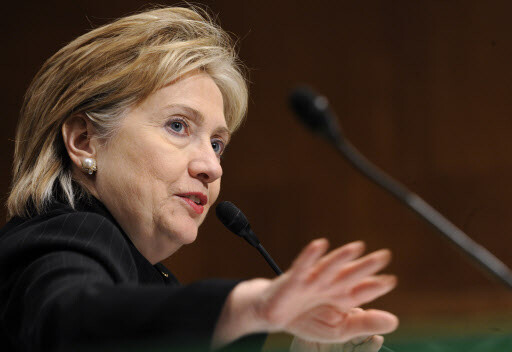hankyoreh
Links to other country sites 다른 나라 사이트 링크
Clinton has tough words for North Korea

With North Korea putting intense pressure on the United States through intimating that it may conduct a second nuclear test or an additional long-range missile test, U.S. Secretary of State Hillary Clinton said at a Senate Appropriations Committee hearing Thursday (local time) that North Korea was digging itself into a deeper hole. She had some tough words, saying North Korea would get no economic aid as long as it refused to join the six-party talks.
She also said, “We are very serious about trying to make it clear to North Korea that their recent behavior is absolutely unacceptable.”
Clinton’s public skepticism about the possibility of an early resumption of the six-party talks warrant attention. She added that at the current time, North Korea’s return to the six-party talks was “implausible, if not impossible.” This is the most negative comment concerning the six-party talks made by an U.S. official since the start of the Obama administration.
A high-ranking South Korean government official warned against interpreting Clinton’s statement too broadly, however, saying Friday that she meant to describe how the current situation appeared. He pointed out that her comment was simply a natural and basic statement concerning both North Korea’s repeated refusal to rejoin the six-party talks and its consistent hard-line tactics, and not a reevaluation of the value of the six-party talks themselves.
How the U.S. will respond to North Korea’s pressure should become more concrete with U.S. Special Representative for North Korea Policy Ambassador Stephen Bosworth’s tour of South Korea, China, Japan and elsewhere, scheduled for next week.
When U.S. State Department acting spokesman Robert Wood was asked during a regular briefing whether the US was also considering a “Plan B,” a military response, he said the U.S. would mobilize all its diplomatic tools. This indicates that a military response is being excluded from consideration.
The U.S. does not have a lot of diplomatic options it can realistically take, however. Besides United Nations Security Council sanctions on North Korea, it could work to place additional financial and economic sanctions on North Korea through cooperation with other participants in the six-party talks, or it could consider a plan to push for “five-party talks” excluding North Korea. China, the chair nation of the six-party talks that has great influence on North Korea, has strongly opposed this. In this regard, the results of Bosworth’s talks when he visits China are important.
Another option is high-level bilateral talks between North Korea and the U.S., as wished for by North Korea. Ambassador Bosworth, too, has expressed an intention to engage in direct talks with North Korea. The mood, however, is that the U.S. is not currently seriously considering high-level talks with North Korea that includes having Secretary Clinton negotiate directly. This will not satisfy the expectations of North Korea, which seemingly desires an early package settlement through comprehensive high-level talks. Kim Yeon-cheol, director of the Hankyoreh Peace Research Institute says insufficient preparation on the U.S. side is the problem, and that with North Korea coming out tough, the U.S., too, needs to come out with a tough line for negotiations.
Please direct questions or comments to [englishhani@hani.co.kr]
Editorial・opinion
![[Column] Park Geun-hye déjà vu in Yoon Suk-yeol [Column] Park Geun-hye déjà vu in Yoon Suk-yeol](https://flexible.img.hani.co.kr/flexible/normal/500/300/imgdb/original/2024/0424/651713945113788.jpg) [Column] Park Geun-hye déjà vu in Yoon Suk-yeol
[Column] Park Geun-hye déjà vu in Yoon Suk-yeol![[Editorial] New weight of N. Korea’s nuclear threats makes dialogue all the more urgent [Editorial] New weight of N. Korea’s nuclear threats makes dialogue all the more urgent](https://flexible.img.hani.co.kr/flexible/normal/500/300/imgdb/original/2024/0424/7317139454662664.jpg) [Editorial] New weight of N. Korea’s nuclear threats makes dialogue all the more urgent
[Editorial] New weight of N. Korea’s nuclear threats makes dialogue all the more urgent- [Guest essay] The real reason Korea’s new right wants to dub Rhee a founding father
- [Column] ‘Choson’: Is it time we start referring to N. Korea in its own terms?
- [Editorial] Japan’s rewriting of history with Korea has gone too far
- [Column] The president’s questionable capacity for dialogue
- [Column] Are chaebol firms just pizza pies for families to divvy up as they please?
- [Column] Has Korea, too, crossed the Rubicon on China?
- [Correspondent’s column] In Japan’s alliance with US, echoes of its past alliances with UK
- [Editorial] Does Yoon think the Korean public is wrong?
Most viewed articles
- 1‘We must say no’: Seoul defense chief on Korean, USFK involvement in hypothetical Taiwan crisis
- 2N. Korean delegation’s trip to Iran shows how Pyongyang is leveraging ties with Moscow
- 3‘Weddingflation’ breaks the bank for Korean couples-to-be
- 4Korea sees more deaths than births for 52nd consecutive month in February
- 5[Column] Park Geun-hye déjà vu in Yoon Suk-yeol
- 6Will NewJeans end up collateral damage in internal feud at K-pop juggernaut Hybe?
- 7[Column] Has Korea, too, crossed the Rubicon on China?
- 8Amnesty notes ‘erosion’ of freedom of expression in Korea in annual human rights report
- 9Samsung barricades office as unionized workers strike for better conditions
- 10[Column] The clock is ticking for Korea’s first lady